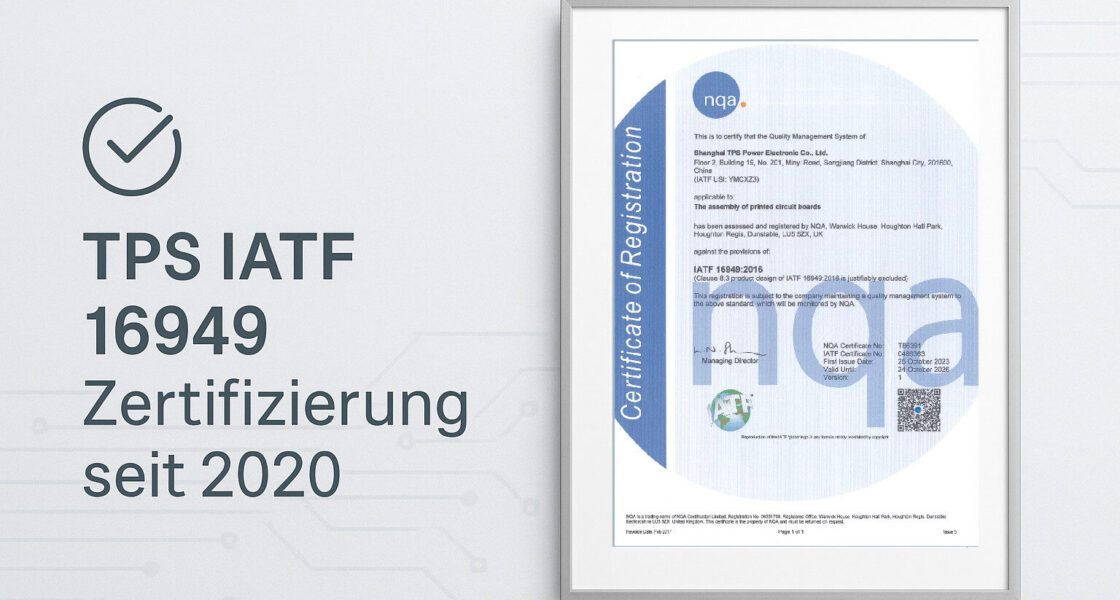In 2020, TPS Elektronik GmbH obtained IATF 16949 certification, the internationally recognized standard for automotive quality management systems. The certification aligns TPS’s quality processes with industry expectations and supports consistent delivery, risk control, and continuous improvement across relevant manufacturing and support activities.
Key takeaways
- IATF 16949 certification (2020): TPS’s quality management system was certified in 2020 according to IATF 16949.
- Built on ISO 9001: The standard extends ISO 9001 with automotive-specific requirements (e.g., risk-based thinking, traceability, and defect prevention).
- Practical benefits: More stable processes, clearer documentation, and better integration with automotive customers and suppliers.
- Ongoing work: Compliance involves regular surveillance audits and continuous improvement measures.
What is IATF 16949?
Die IATF 16949 is a global automotive quality management standard developed by the International Automotive Task Force (IATF). It specifies requirements for a QMS that enables organizations to:
- Prevent defects by identifying and controlling risks early in the process.
- Standardize and stabilize processes to reduce variation and rework.
- Improve continuously through corrective actions and lessons learned.
- Meet customer and regulatory requirements with documented, auditable procedures.
In practice, companies apply core quality tools such as APQP, PPAP, FMEA, MSA, and SPC to plan, verify, and monitor product and process quality throughout the lifecycle.
Why TPS pursued IATF 16949 certification
Electronics are increasingly central to modern vehicles—from power electronics to embedded systems. To meet the expectations of OEMs and Tier-1 suppliers, TPS pursued IATF 16949 certification in 2020 to:
- Strengthen collaboration with automotive customers who require standardized QMS evidence.
- Enhance traceability and risk control across procurement, assembly, testing, and logistics.
- Align with international expectations for documentation, change control, and supplier management.
- Offer transparent processes that support reliable delivery and clear communication.
Benefits for customers and partners
For customers and supply-chain partners, an IATF 16949-certified QMS can support:
- Consistent quality: Defined procedures, training, and controls that help reduce process variation.
- Efficient integration: Easier onboarding where IATF 16949 is a prerequisite, including common formats for approvals and audits.
- Clear documentation: Traceability, change control, and corrective actions are documented and reviewable.
- Risk mitigation: Structured methodologies to identify, evaluate, and address potential issues.
Compliance note: IATF 16949 certification confirms the quality management system meets the standard’s requirements. It is not a guarantee of individual product characteristics. Customers seeking confirmation should review the current certificate and scope upon request.
Scope and ongoing compliance
DIATF 16949 applies to the quality management system and its audited scope (e.g., specified manufacturing and support processes at the certified site[s]). Maintaining certification involves:
- Regular surveillance and recertification audits by an accredited body.
- Internal audits and management reviews to monitor performance.
- Corrective and preventive actions to address nonconformities and risks.
- Supplier development and control aligned with automotive requirements.
TPS integrates these activities into day-to-day operations—from component procurement and PCB assembly to testing and delivery—to keep processes aligned with the standard.
Practical tips for working with an IATF 16949-certified supplier
- Request the current certificate and scope to confirm the audited site(s) and activities.
- Align on requirements early: Share drawings, specifications, and special characteristics for APQP/PPAP planning.
- Define change control: Agree on how engineering changes and deviations are requested, approved, and documented.
- Discuss measurement data: Clarify needed evidence (e.g., capability studies, MSA results) and reporting cadence.
Conclusion
TPS’s IATF 16949 certification (2020) is an important step in aligning its quality management system with recognized automotive requirements. For customers and partners, it provides a structured basis for collaboration—supporting consistent processes, documented controls, and continuous improvement across the supply chain.




